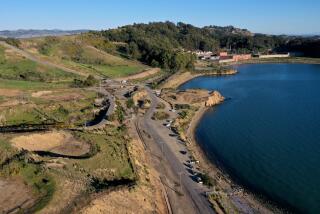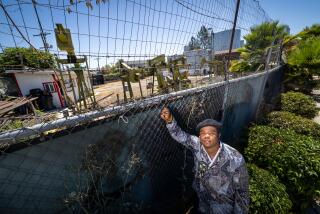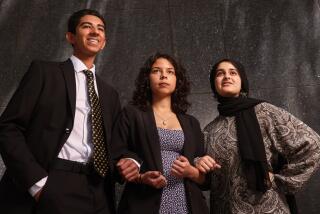Trial Pits Earth First! Against U.S., Oakland
- Share via
OAKLAND — More than a decade after Judi Bari accused FBI agents and local police of framing her in a car bombing--and five years after she died of breast cancer--the fiddle-playing, in-your-face Earth First! activist is getting her day in court.
Bari’s civil rights lawsuit against federal agents and the Oakland Police Department is in mid-trial here, another in the periodic bouts between Northern California’s radical community and the establishment.
At the plaintiffs’ table, attorneys are bearded and pony-tailed. One left court with his papers stuffed into a Victoria’s Secret shopping bag. Another sniffed a small wildflower during his colleague’s aggressive questioning of a retired FBI agent.
The haircuts are shorter and briefcases conventional at the other counsel table, where straight-faced lawyers for the U.S. Department of Justice and the city of Oakland defend their clients’ handling of the bombing case.
The federal suit was filed by Bari and fellow Earth First! activist Darryl Cherney a year after a pipe bomb ripped through Bari’s cluttered Subaru as the two drove down an Oakland street. Cherney sustained minor injuries. Bari was hospitalized for weeks with pelvic, colon and nerve damage from which she never fully recovered.
Within a day of the May 1990 explosion, while Bari was in intensive care, Oakland police arrested the pair on charges of possessing and transporting an explosive device.
Alameda County prosecutors later said they did not have sufficient evidence to pursue the case, and charges were never filed. No other arrests were ever made.
Cherney and Bari believed someone had tried to kill them. It was a volatile time on the North Coast as environmentalists and the timber industry clashed over the logging of old-growth forests. There were rallies, logging-truck blockades and tree-sits. Bari was at the forefront.
She had received death threats: a drawing of a noose, a photo with the crosshairs of a rifle’s telescopic sight imposed on her face. The year before, a logging truck had rammed the car she was riding in.
But, she claimed, authorities didn’t care, instead pointing the finger at her and Cherney when the nail-wrapped pipe bomb exploded inches from her. Years later she would say the government had not only accused them of being violent terrorists but also of “stupid, violent terrorists” who blew themselves up.
The note-scribbling jury of nine women and three men in U.S. District Court are in essence being asked to decide now whether authorities had good reason to suspect that Bari and Cherney were carrying a bomb that accidentally blew up, or whether law enforcement used the bombing to go after an annoying bunch of radical environmentalists.
During its slow trip to trial, the federal civil rights lawsuit was considerably narrowed by rulings that barred efforts to portray the Bari-Cherney arrests as part of a much broader, historic FBI campaign to repress radical political dissent. Bari’s camp is nonetheless doing its best to make a forum of the trial.
“This lawsuit became the vehicle to talk about these FBI programs that do tremendous damage to the progressive community.” said Karen Pickett, a Bari friend and long-time Earth First! organizer. “It is an attempt to hold these people accountable for their actions.”
Pickett is among a faithful following of Bari-Cherney supporters and Bay Area lefties who are filling courtroom benches during the seven-week trial before Judge Claudia Wilken.
They are listening to a sometimes tedious, occasionally funny or angry recounting of how authorities conducted the bombing investigation, what they said and what they concluded. Among the key plaintiffs’ assertions is that law enforcement lied about the bomb’s placement in the car and about whether nails wrapped around the pipe bomb matched those that Bari, a carpenter, had in her car or home.
An expert witness for the plaintiffs’ side testified that damage to Bari’s 1981 Subaru clearly showed that the bomb was under the driver’s seat--suggesting that it had been hidden there by someone other than the occupants.
In an interview, Joseph Sher, Department of Justice senior trial counsel and the lead defense lawyer, said the plaintiffs’ court presentation so far “indicates their argument is that because FBI agents in other places were investigating the criminal conduct of people associated with Earth First! ... that demonstrates these defendants were out to get Earth First! That’s nonsense.”
Concerning the bomb placement, he said that “every trained bomb investigator at the scene ... agreed it was reasonable to conclude these people were carrying the bomb based on what they saw at the scene.”
And though authorities were unable to prove their early statement that nails taken from Bari’s home matched those in the bomb, Sher said that was because the manufacturing batch was too large to ascertain a sure match.
The defense, which will start to present its case next week when the plaintiffs finish theirs, expects to put about 10 witnesses on the stand. Called by plaintiffs earlier in the trial, one defendant said he and other investigators had acted in good faith.
“We had a lot of information about them,” retired Oakland Police Sgt. Michael Sitterud said. “It looked like a good case to me. It looked like it was their bomb.”
Founded in 1980 in Arizona, Earth First! has operated as a loose-knit network of environmental activists who avoid membership rolls and traditional leadership and favor attention-getting tactics--from sitting for weeks in ancient trees threatened by logging to driving spikes into their trunks to chew up chainsaw blades.
Cherney says he never spiked trees, and Bari had made a point of disavowing violence. When the bomb exploded they were on their way to UC Santa Cruz, where they planned to give a concert and recruit students for the Redwood Summer of 1990, a series of civil disobedience actions on the North Coast aimed at stopping the cutting of centuries-old redwoods.
“I’m talking and all of a sudden I heard a crack and my ears were ringing,” Cherney recalled over a falafel and pita supper at a Berkeley diner. “My first reaction was that I was dead.”
He escaped with ruptured eardrums and cuts. Bari, seriously injured and screaming in pain, had to be pried from the driver’s seat with machinery.
“Judi and I had big mouths, and were associated with a radical environmental group and were proud of it,” he says by way of explaining why anyone would target them.
Cherney, who had been Bari’s lover (the couple was in the midst of one of their frequent break-ups at the time of the bombing), describes her as having the IQ of Einstein and “the voice of a 7-year-old, maybe 8.”
Short and funny, she also possessed acute radar for sexist remarks and the ability to inspire. “She was our regional Martin Luther King,” Cherney said.
Like Bari, he is a songwriter and musician who grew up on the East Coast. The bushy beard he had at the time of the bombing has been shaved, his thick, dark hair neatly trimmed. He wears a navy blue blazer and button-down shirts to court.
But he lives in a one-room geodesic dome in Humboldt County, writes satirical lyrics and continues to organize for Earth First!, which though quieter and smaller than it was in the early 1990s, still runs tree-sits in Northern California.
With attorneys who have either worked cheaply or for nothing, Bari was heavily involved in the lawsuit until shortly before her 1997 death of breast cancer. She summarized depositions--there are more than 100--and organized thousands of pages of government documents obtained in discovery.
She also gave concerts to raise money for the case. And she laughed about it.
In one song about the FBI, she laments: “They took away my Birkenstocks/They took away my car/But when they took away my fiddle they went too far.”
More to Read
Sign up for Essential California
The most important California stories and recommendations in your inbox every morning.
You may occasionally receive promotional content from the Los Angeles Times.










